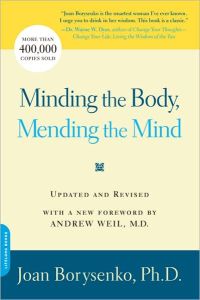Join getAbstract to access the summary!

Join getAbstract to access the summary!
Joan Borysenko
Minding the Body, Mending the Mind
Da Capo Press, 2007
What's inside?
Want to deal better with life’s curve balls? Nurture both your body and your mind.
Recommendation
When it was first published in 1987, this self-help New York Times bestseller by Joan Borysenko, Ph.D., catapulted the importance of the mind/body connection into mainstream consciousness. The foreword by natural health guru, Andrew Weil, M.D., introduces you to Borysenko and her comprehensive techniques for managing stress. Although the book’s sections could be better organized, overall it remains relevant, useful and thought provoking, particularly for hard-charging Boomers who are aging in stressful times. Borysenko shares her personal journey (starting with an excessive stress reaction that landed her in the hospital), and includes examples from her patients. She provides relaxation, exercise and meditation techniques, and addresses the challenges of trying to incorporate these methods into your life. She also details common “mind traps” that can compromise your wellbeing. Her approach is creative, flexible and forgiving, and she includes an excellent recap of key points at the end of the book. getAbstract recommends this book wholeheartedly to those who want to optimize their health and be more effective.
Summary
About the Author
Joan Borysenko, Ph.D. is a graduate of Harvard Medical School; a licensed psychologist; a founder of Mind/Body Health Sciences, L.L.C., in Boulder, Colorado; host of the radio show, Your Soul's Compass; and author of The Power of the Mind to Heal and Inner Peace for Busy Women, among other titles.

















Comment on this summary